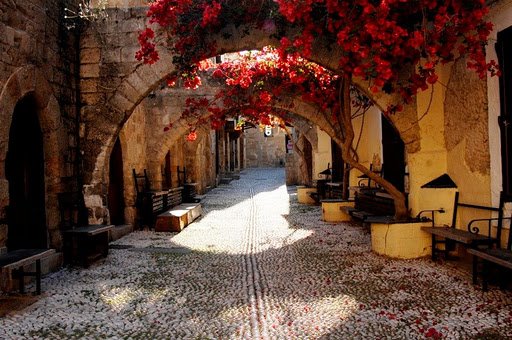Neighbor Procedure=Human Shields
The very first poems seemed to struggle linguistically-I had hard time making sense of it and finding meaning. As I continued, I was confused with all the names that I did not have any association or reference to. The section Shoot & Weep was the most difficult. The reader senses a hidden message within the language and structure of the poems.
The presence of a different language and different names sends an alarm of a cultural awareness or, I should say, unawareness. The poems that include a stanza of the same repetitions and Hebrew make the reader want to know what the book is about.
There is an ironic political definition in the title itself. When one thinks of neighbors one usually things of common interests but not in this case.
In the second section Book of Comparisons is the most experimental in visual poetry. The words do not have any order, they king of flow on the page after page. In between Hebrew there are a few words that talk of shame and fruits on the ground. Is it a prayer?
It is to separate the political from the artistic. Does Zolf want this poetry to be political poetry or is more of an expose? Does poetry give a name to the many who died in the neighbor procedures? Is this a litany? Do we read the names out loud? The poems do work as social and cultural commentaries.
The Innocent Abroad section contains conventional structure poems as well as experimental ones. L’eveil section is written in a target after it follows the single page of a gun target. It is threatening to the reader even to imagine a life of torment and murder. Also, the hints and references to America are suspicious to me. It acquires a few questions from the reader.
How involved are we? Does this selection of poems suggest?
Is this political poetry? How?
How do we relate to the foreign names mentioned?
What are some of the linguistic difficulties in reading these poems?
Do we need to do research to understand the poet’s intention better? Are we forced to take side on the Palestine and the Israeli war?

Maria,
I too have struggled with this book of poems. I lack knowledge about the middle east and like you said- we can sense there is a message in there somewhere- but you have trouble finding it and figuring it out.
America is involved with Israel. I do not know to what extent but I always hear my grandpa say something along the lines of “If America abandons Israel we’re all going to hell… etc” it all goes back to how America is a “Christian nation” even though we have no official religion… My personal opinion about it is we have no business in the middle east, they have been fighting for thousands or years and they will fight for thousands more.
Yes, this is political poetry because it’s talking about this war torn area of the world and how countries are connected to it. Unfortunately specifics are lost to me, I just got the vibe and sensed the political nature of this book.
So, obviously, I need to do some more research in order to better understand, this book and the author’s intention. I think most Americans would need to do the same research so I think it is clear that this book was not made to rake in the cash. It was created to send a message and that message is lost to a majority of us who are not equipped with political knowledge, religious knowledge and knowledge of other languages to interpret it immediately.
Hi Derek- Very few poetry books rake in the cash…but I do agree with you that there is a message just by the action of writing the book…she chose this particular topic for a reason, isn’t that political?
One of the reviews linked takes up the question of political poetry — what it is and why this might quality. Maria, one of your concerns has to do with authorial intention; but I am not sure that taking the implicit model of an author with a message to convey works especially well here. Perhaps more like an author who is engaging on a journey, which is in part a linguistic / poetic path.
I think that every poem is a political act. Especially taking up a topic that is still active and controversial. Her intent seems to me to have had a rooted plan on how we look at people who believe they belong to a place that no longer exists. This in itself a poetic playground, no matter how she handles the linguistic and personal opinions.